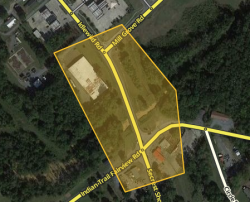Kartografer (talk | contribs) (added markup and minor corrections) |
Kartografer (talk | contribs) (added a link) |
||
| Line 17: | Line 17: | ||
'''Principal arterials''' are the primary routes for traveling throughout the country, from one city to another, over long distances. Many principal arterials are freeways or expressways, but many others are not. | '''Principal arterials''' are the primary routes for traveling throughout the country, from one city to another, over long distances. Many principal arterials are freeways or expressways, but many others are not. | ||
As a nationwide system, the [[wikipedia:United_States_Numbered_Highway_System|United States Numbered | As a nationwide system, the [[wikipedia:United_States_Numbered_Highway_System|United States Numbered Highways]], or '''U.S. Highways''', provide direct links between regions not served by the [[wikipedia:Interstate_Highway_System|Interstate Highway System]] and serve as alternatives to travel on Interstates in the case of heavy traffic or incident. | ||
| Line 29: | Line 29: | ||
*Roads in the '''United States Numbered Highways''' system (US Highways). | *Roads in the '''United States Numbered Highways''' system (US Highways). | ||
**This includes [[wikipedia:Alternate_route|alternate]] (ALT), [[wikipedia:Bypass_(road)#United_States|bypass]] (BYP), connector (CONN), truck, and scenic US Highways. | **This includes [[wikipedia:Alternate_route|alternate]] (ALT), [[wikipedia:Bypass_(road)#United_States|bypass]] (BYP), connector (CONN), truck, and scenic US Highways. | ||
**This does ''not'' include | **This does ''not'' include [[wikipedia:Business_route|business]], spur, and loop US Highways. | ||
*Business routes (Spurs and Loops) in the Interstate Highway System (e.g., I-69 Business Loop). | *Business routes (Spurs and Loops) in the Interstate Highway System (e.g., I-69 Business Loop). | ||
Revision as of 20:16, 30 June 2019
Parking lot examples
If a parking lot area place is contained within a larger area place, do not repeat the larger place's full name. For example, if the Domestic Garage is contained within the boundaries of the "SFO San Francisco International Airport" area place, it need not be named "SFO San Francisco International Airport Domestic Garage"; "Domestic Garage - SFO" is sufficient.
If a mall or shopping center has several lots which can be associated with various anchor stores in the mall/shopping center, the lots can be named for the anchor stores. For example: "Macy's Lot - Big Hill Shopping Center"
In rare cases, a municipality or district provides public parking distinct from any other area place but without any documented or signed identity. These can be named after the municipality or district, for example, "Redwood City Public Parking". Do not use completely generic names such as "Parking" or "Public Parking" for anonymous parking facilities.
Understanding inside a junction box
| There are many types of scenarios where a junction box may be indicated, this sample is used just to explain the function of a junction box, and not meant as guidance on where to use them. |

To illustrate this concept, let's take a look at this intersection. There are five segments entering/exiting the junction box (segments which are only partially inside the junction box). There are another four segments which are wholly inside the junction box. If there were no junction box at this intersection, the individual turn delay (the time it takes to turn from one segment to the next) data for the outer five segments would be merged together at the inner four segments, and it would be distorted. The junction box here alleviates the problems with collecting accurate turn delays caused by the short segments in the middle.
Major Highway 

Principal arterials are the primary routes for traveling throughout the country, from one city to another, over long distances. Many principal arterials are freeways or expressways, but many others are not.
As a nationwide system, the United States Numbered Highways, or U.S. Highways, provide direct links between regions not served by the Interstate Highway System and serve as alternatives to travel on Interstates in the case of heavy traffic or incident.
The following roads are to be classified, at minimum, as major highway :
- Roads classified in FHWA's functional classification as Principal Arterials or Other Principal Arterials.
- Roads classified in FHWA's functional classification as Other Freeways and Expressways which do not meet the criteria for the freeway type
- This includes partially-limited-access roadways (or "expressways"). These are roads that have a lot of the characteristics of freeways but also have occasional at-grade intersections with other roads.
- Note: Every partially-limited-access roadway is a major highway ; this does not mean that every major highway must be partially-limited-access.
- Note: "Expressway" is used as a shorthand term for partially-limited-access roads. This does not mean every road named "Expressway" is a major highway .
- Note: Some states refer to this class as Other Freeways. In these states, every road in this class is a freeway .
- Roads in the United States Numbered Highways system (US Highways).
- Business routes (Spurs and Loops) in the Interstate Highway System (e.g., I-69 Business Loop).